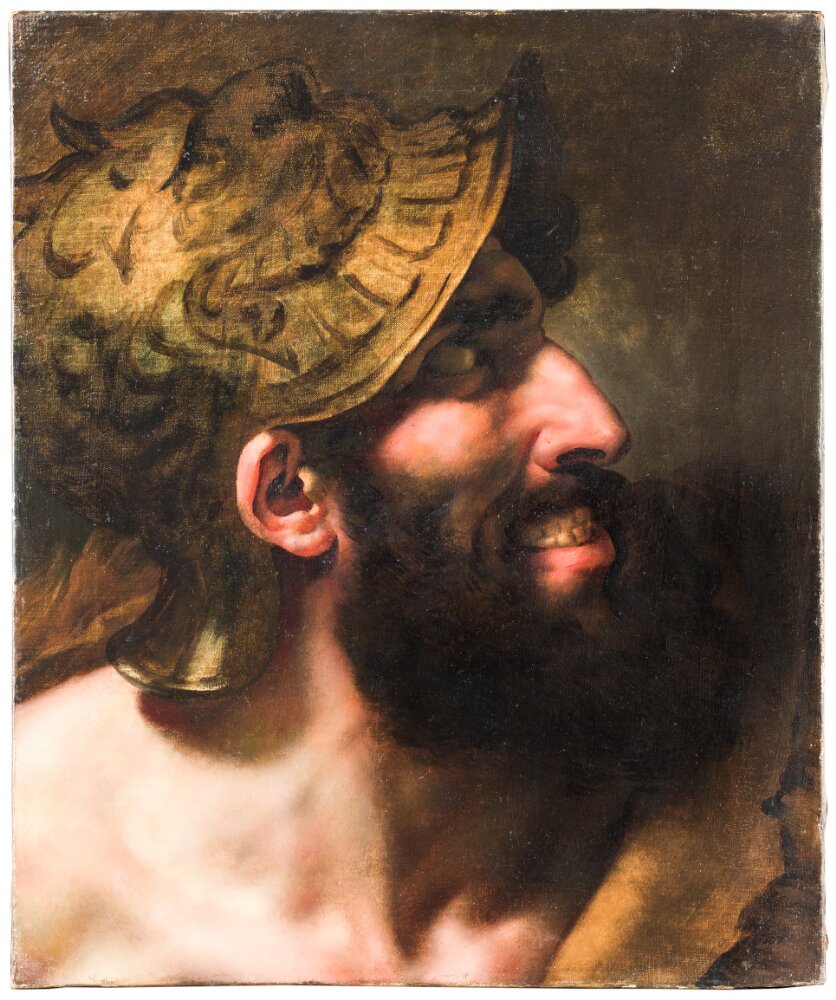CAPANEUS IN GREEK MYTHOLOGY
Capaneus in Greek Mythology
Capaneus was a hero from the tales of Greek mythology, appearing in the tale of the Seven Against Thebes; the heroic tale of the Seven Against Thebes was one of the most important tales of antiquity, although today, it is less well known than the tales of Troy, or adventures of Heracles.
Capaneus Son of Hipponous
|
Capaneus was the son of Hipponous, with the mother of Capaneus is named as either Astynome or Laodice. Asytnome was the daughter of Talaus, a king of Argos, whilst Laodice was the daughter of Iphis, another king of Argos.
At the time of Capaneus, Argos was divided into three kingdoms, a division that had occurred during the time of Melampus. Capaneus’ link to one of the royal lines of Argos was important though. Further links to the royal families of Argos were strengthened when Capaneus married Evadne, a daughter of Iphis. Capaneus then became a father, for Evadne gave birth to a son, Sthenelus. |
Capaneus and the Seven Against Thebes
At this time, trouble was occurring in Thebes, for though the sons of Oedipus, Eteocles and Polynices, had agreed to share the throne of Thebes, potentially ruling in alternate years. It was said though that Eteocles, refused to relinquish the throne when it was time for Polynices to rule, and instead Polynices was exiled from Thebes.
Polynices found refuge in Argos, and one of the kings of Argos, Adrastus, then taking note of a prophecy, and married Polynices to his daughter, Argea. Adrastus also promised to raise an army to reclaim the throne of Thebes for Polynices.
This army would be led by seven commanders, the Seven Against Thebes, and although the names of the seven do vary between the surviving sources, Capaneus is always named as one of the Seven.
Polynices found refuge in Argos, and one of the kings of Argos, Adrastus, then taking note of a prophecy, and married Polynices to his daughter, Argea. Adrastus also promised to raise an army to reclaim the throne of Thebes for Polynices.
This army would be led by seven commanders, the Seven Against Thebes, and although the names of the seven do vary between the surviving sources, Capaneus is always named as one of the Seven.
Capaneus and the Attack on ThebesWhen the Argive army arrived at Thebes, each commander was said to have been given the task of taking one of the seven gates of Thebes, with Capaneus either assailing the Electrian or Ogygian Gate, where he faced either Dryas or Polyphontes as the named defender.
Capaneus was regarded as a great warrior, with immense strength and skill. Capaneus though also had a serious flaw, for he was arrogant in the extreme. Capaneus would proclaim that even the thunderbolts and lightning of Zeus could not prevent him from taking Thebes. Such hubris was unlikely to go unnoticed by any god, and of course Zeus took note of the boast. Thus, it was, that as Capaneus scaled a ladder, positioned against the walls of Thebes, so Zeus struck him dead with a bolt of lightning. Afterwards, as Capaneus’ funeral pyre was being lit, so his wife, Evadne leapt upon the pyre, killing herself. Occasionally, it was said that Capaneus was brought back from the dead by Asclepius’ healing prowess, something which would lead to Asclepius’ own downfall. |
|
Sthenelus Son of capaneus
The attack on Thebes did not go well for the Seven, and it was said that all the attackers, bar Adrastus died in the attempt to take the city; with the sons of Oedipus, Polynices and Eteocles killing each other when they fought.
The defeat of the Seven, gave rise to the tale of the Epigoni, when the sons of the Seven, Sthenelus included, sought to avenge their fathers.
Capaneus himself was never a king of Argos, but his son, Sthenelus succeeded Capaneus’ father-in-law, Iphis, as king. Capaneus’ son would establish himself as hero of note, for he was one of the Epigoni, the sons who avenged their fathers at Thebes, as well as being one of the Achaean leaders at Troy.
It would then be Capaneus’ grandson, Cylarabes, who would reunite the three kingdoms of Argos into one.
The defeat of the Seven, gave rise to the tale of the Epigoni, when the sons of the Seven, Sthenelus included, sought to avenge their fathers.
Capaneus himself was never a king of Argos, but his son, Sthenelus succeeded Capaneus’ father-in-law, Iphis, as king. Capaneus’ son would establish himself as hero of note, for he was one of the Epigoni, the sons who avenged their fathers at Thebes, as well as being one of the Achaean leaders at Troy.
It would then be Capaneus’ grandson, Cylarabes, who would reunite the three kingdoms of Argos into one.
|
|
Colin Quartermain - Capaneus - 4th February 2020
